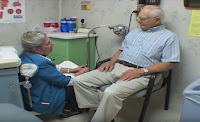Thanksgiving dinners are a time of togetherness, celebrated with relatives and friends. Those challenged with a dementia such as Alzheimer’s just need a special touch.
“Family members may be unsure of how to approach a loved one who experiences memory loss, repeats conversations, forgets members of the family, and is confused,” notes Dr. Stephen Moelter, associate professor of psychology at University of the Sciences. “This can cause family members to feel uncomfortable”.
Dementia Books & Videos on Amazon:
FREE Newsletter:
Dr. Moelter believes that adults and children alike can arm themselves with ways to engage people with memory difficulty to ensure a more meaningful holiday season.
- Family members must educate themselves about dementias such as Alzheimer’s disease. Learning more about the disease will help family members understand the importance of keeping their loved one safe and surrounded by supportive people. Helpful information can be found on most related topics in the list of helpful subjects to the left.
- Engaging people with a dementia such as Alzheimer’s in conversation and keeping them involved in activities is vital to their health. Dr. Moelter suggests that conversation should be at the level of the loved one and it is ideal to let them lead. Fundamentally, although it may sometimes seem unusual, family members should know that it is okay to answer repeated questions with the same answers. “What matters most is that we answer with interest and a positive tone and understand that it is not helpful to question the person about the memory problem or to challenge them to remember,” adds Dr. Moelter. Challenging someone with a dementia such as Alzheimer’s can lead to increased anxiety and may make memory, cognition, and behavior worse. Such challenging or “testing” of your family member will not help them to remember more.
- When speaking, family members should try to ask questions that rely on “old knowledge” and encourage reminiscing about holidays past. In general, people with memory problems have the best memory for distant events with more impairment as the people and events to be recalled become more recent. For instance, it may be easier for the person with memory problems to talk about the holidays when they were a child or young adult compared to a more recent holiday.
- Parents should prepare their children for conversations and can help by offering suggestions of things to ask their family member. Topics may include those that parents know are strong and positive and old memories such as hobbies, jobs, or family events. “Alzheimer’s can be especially challenging for children to comprehend,” admits Dr. Moelter. “It is important parents understand this and give younger children permission to keep interactions brief if they feel uneasy.”
VIDEO: Thanksgiving Tips for a Dementia-Friendly Holiday












This is such a lovely and helpful post. My uncle has it and I can share this post with my cousin too. Since thanksgiving is around the corner, we can take him out to his favorite event space and can enjoy dinner together. This is a beautiful and very helpful post.